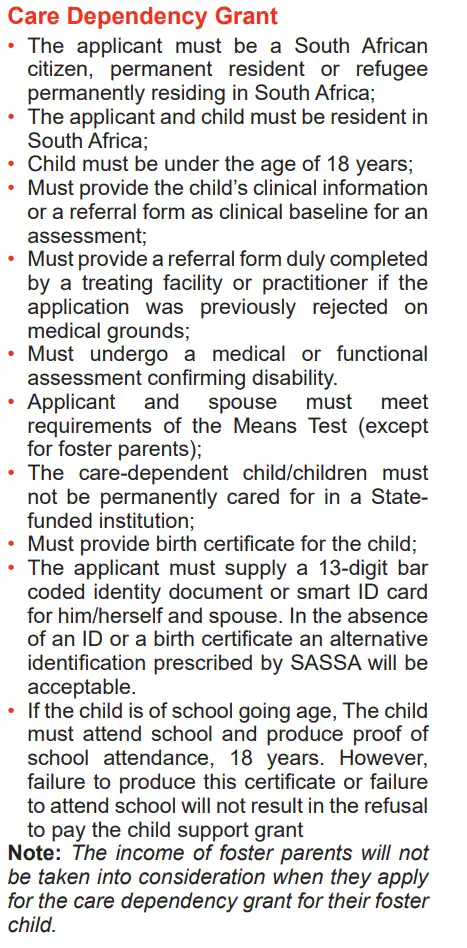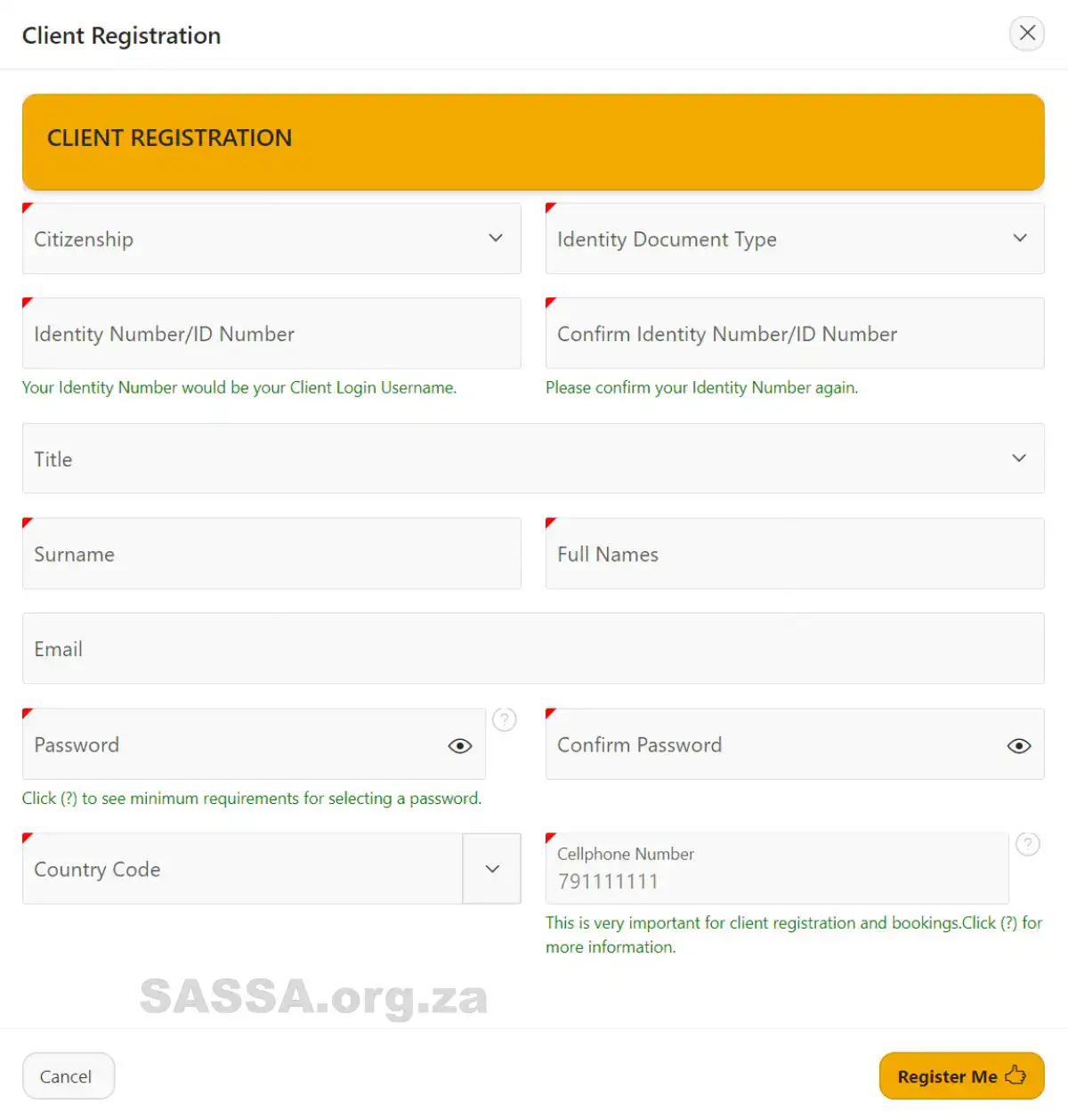Care Dependency Grant – Status, Application & Eligibility

The Care Dependency Grant is an important social assistance grant from SASSA for caregivers of children with severe disabilities requiring full-time care.
Here is a detailed guide explaining everything about the Care Dependency Grant in South Africa:
What is the Care Dependency Grant?
- Monthly SASSA grant for caregivers of children severely disabled before age 18
- To assist with additional costs of caring for the child’s high needs
- For biological parents, foster parents, or primary caregivers of the disabled child
- The child needs permanent home care due to physical or mental disability
- Doctor assessment and medical reports are required to confirm the child’s disability
- Household income testing used to determine eligibility
- Around 150,000 children benefit from the Care Dependency Grant
SASSA Status Check
You may check your SASSA SRD R350 and Other Grants (Child Support, Old Person’s, Foster Child, Disability, Care Dependency, War Veteran and Grant-In-Aid) status online on our website with just one simple click.
Eligibility Criteria for the Care Dependency Grant

The following criteria must be met to qualify for the grant:
Primary Caregiver Requirements
- South African citizen, permanent resident, or refugee with valid papers
- Resides in South Africa
- Must be the primary caregiver of the disabled child
Child Requirements
- South African citizen, permanent resident, or refugee
- Younger than 18 years old
- Needs permanent care due to severe mental or physical disability before age 18
- Not cared for in state institution
- Not already receiving another social grant
Disability Requirements
- The nature of disability requires permanent home care
- Medical assessments and reports from doctors confirming severe disability
- Disability prevents children from caring for themselves or functioning independently
Income Requirements
- Primary caregiver and spouse must pass the means test for the household income threshold
- Except for foster parents who can exceed the threshold
How to Apply for the Care Dependency Grant
Eligible primary caregivers of a disabled child can apply in two ways:
Online Application
- Visit the SASSA website (https://services.sassa.gov.za/) and register on the portal
- Capture child’s details, and disability details and upload reports and IDs
- Upload a copy of the doctor’s assessment reports confirming the child’s disability
- Submit the completed online Care Dependency Grant application
In-Person Application
- Visit your nearest SASSA regional office and request an application form
- Complete in full and submit along with the child’s birth certificate, ID, doctor’s reports, etc.
- SASSA agent captures details and initiates the assessment process
- Return on the specified date for a status update and provide additional details
Note applicants must provide accurate details for themselves and their child. Do not falsify information as this constitutes fraud.
Care Dependency Grant Documentation Needed
Applicants need to submit the following valid documentation when applying:
- The child’s original birth certificate and clinic card
- Child’s ID document if aged over 16 years
- Primary caregiver’s green barcoded ID book or Smart ID
- Primary caregiver’s proof of residence
- Recent bank statement if the grant to be deposited
- Comprehensive doctor’s assessment report confirming child’s severe disability
Care Dependency Grant Medical Assessments
A key part of the application is submitting detailed medical assessments which must:
- Be completed by a registered pediatrician or specialist doctor
- Confirm the child has a severe mental or physical disability
- Provide details of the disability including diagnosis, severity, limitations caused
- Specify how the disability renders the child fully dependent on a caregiver
- Indicate any aids, medications, or special care needed
- Assessments must be recent – within 3 months prior to grant application
Care Dependency Grant Amount
| Grant Name | OCT 2024 | OCT 2024 | APR 2025 | OCT 2025 | APR 2026 |
| Care Dependency Grant | R2,180 | R2,190 | R2,310 | R2,320 | R2,400 |
- R2,400 per care dependent child per month from April 2026
- Uniform amount nationwide does not vary geographically
- Multiple qualifying children can be claimed
- The monthly amount increases slightly annually in line with inflation
The funds help cover the child’s specialized healthcare and disability assistance costs.
Care Dependency Grant Payment Dates
- Paid after Older Persons, Disability, and Child Grants each month
- Payments commence on the 3rd day of each month unless the 3rd falls on a weekend or public holiday
- Primary caregivers get 5 working days from the payment start date to collect the monthly grant
- For example, if the 3rd is a Sunday, payouts start on Tuesday the 5th and until Monday the 10th
- Only paid during the designated 5-day cycle so recipients must collect promptly
Check More: SASSA Grant Payment Dates 2026
FAQs about Care Dependency Grant
How long does it take to process an application?
Expect a processing time of roughly 13 weeks from successful submission to the first payment.
What if my application was rejected?
If your application was denied, lodge an appeal within 90 days providing updated doctor assessments and other documents proving the child’s eligibility.
Can temporary disability grants be extended?
Yes, if a doctor confirms the disability persists in updated medical reports supplied before grant expiry.
What if the child’s health improves before 18?
Notify SASSA immediately with new doctor assessments so the grant can be re-evaluated or terminated appropriately.
What happens when a grant recipient child dies?
Inform SASSA urgently and provide a copy of the death certificate for records so that grant payments will cease.
Final Words
The Care Dependency Grant provides essential financial support to caregivers responsible for children with severe disabilities needing full-time care. Follow the steps carefully to apply and maintain compliance.
